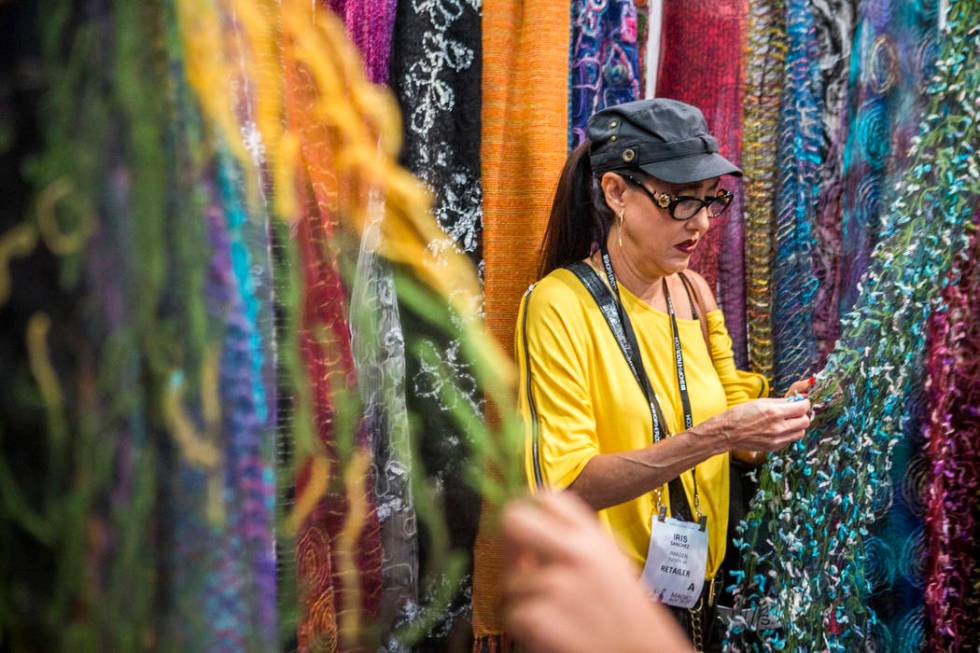Las Vegas apparel industry gets attention at MAGIC show

For two weeks each year, Las Vegas joins the likes of New York City and Paris as one of the world’s greatest fashion hubs.
The biannual MAGIC fashion convention — which runs Tuesday through Thursday — will draw in nearly 78,000 industry experts from across the globe for one of the world’s largest fashion trade shows.
“During the week MAGIC is there … you’ve got a virtual, temporary fashion hub quality,” said Steve Lamar, executive vice president of the American Apparel & Footwear Association, a Washington-based trade association. “It certainly attracts the attention of the industry.”
But industry experts say Las Vegas’ apparel industry is far from being on par with the likes of New York City.
Opportunities to grow
Las Vegas is “not really known” for its apparel industry, according to Timothy Ogburn, program support specialist for UNLV continuing education.
The educational division at UNLV does offer a fashion design certificate program, but it’s the only one of its kind in the state, he said.
Lamar said he’s “not aware of natural design talent that’s out there” in Las Vegas.
Nevada’s apparel manufacturing has been on the decline in recent years, according to data from the Nevada Department of Education, Training and Rehabilitation. In 2017, the average employment rate in this sector was less than one-sixth of what it was in 2006.
Los Angeles’ rising cost of living and minimum wage could incite apparel manufacturers and designers to move elsewhere, including nearby Nevada, said Will Duncan, executive director of North Carolina-based sewn-products industry networking association SEAMS.
“That’s something Las Vegas could capitalize on,” he said. “I think there’s potential there where it could be a fashion hub.”
The MAGIC convention also gives the city an advantage, Lamar said.
“It certainly attracts the attention of the industry,” he said.
But the city has a long way to go.
Lack of ecosystem
According to a report from Los Angeles-based research company IBISWorld, Nevada made up only 0.1 percent of cut and sew manufacturers in the U.S. last year, while California accounted for 59 percent.
Industry analyst Devin Savaskan said these factories tend to be located near major shipping areas.
Landlocked Nevada’s lack of seaport access is putting it at a disadvantage.
“While expected increased costs in California may encourage a few textile mills and apparel manufacturers to relocate operations, the vast majority will still remain in major cities and major trade hubs,” Savaskan said. “This might make it difficult for Nevada to generate new business in the industry.”
Houman Salem, founder and CEO of Los Angeles-based cut-and-sew manufacturer Argyle Haus of Apparel, said that is precisely the case for him.
Two years ago, Salem was ready to pack up his apparel manufacturing business and move it to Las Vegas. California had just seen its first minimum wage hike as part of 2016 state legislation, and Salem was looking for a more business-friendly environment nearby for his small business.
Today, those plans are on hold; Salem said Las Vegas lacks the ecosystem necessary to run his business.
“Until textile providers move, I need to be close to Los Angeles. … A factory cannot exist in the desert in Las Vegas by itself without a support system,” he said. “What also isn’t (in Las Vegas) yet is a labor force. Not at the critical mass I would need.”
Companies moving in
There isn’t much of a garment labor force in Las Vegas, “but that’s not to say (there) won’t be soon,” Salem said. “Word is getting out.”
A growing apparel manufacturing industry in Las Vegas could be a major source of job growth; Salem said he’d need to hire at least 50 people just at the factory level.
He said there’s a good chance those employees will be needed in Las Vegas within the next year and a half.
“It’s gotten to the point where every year, I have to raise prices to meet new regulations (in California). It’s not sustainable,” he said. The plan is to “open a production line (Las Vegas) … We’re waiting to see how the economy shapes up. ”
Finding ways to cut costs in the industry will only become more pressing.
The AAFA found 97 percent of all clothes sold in the U.S. were imported in 2018, and IBISWorld found revenue for the cut-and-sew manufacturing industry is expected to decline 2 percent nationwide over the next five years.
That could mean limited growth opportunities for Nevada, Savaskan said.
“This decline is expected to accelerate going forward,” he said. “Many companies are expected to continue to offshore operations to reduce wage costs in the face of declining revenue and profitability.”
Contact Bailey Schulz at bschulz@reviewjournal.com or 702-383-0233. Follow @bailey_schulz on Twitter.